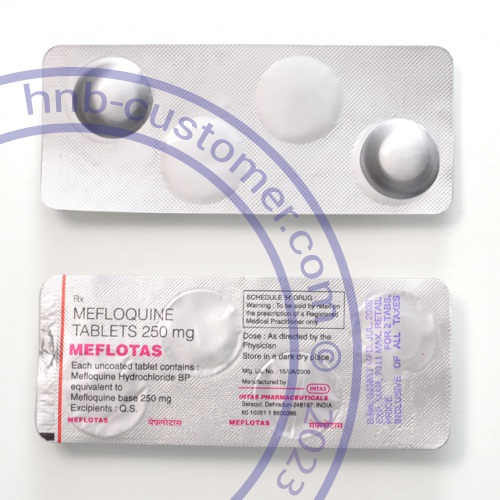

Brand(s):
- Meflotas
Manufacturer:
- Intas
Disease(s):
- Malaria
Known as:
- Lariam
- We can ship our products to any location worldwide
- Enjoy complete anonymity and robust data security measures
- Exclusive certified products at compelling prices
- Skip the hassle of long queues; get your medicines hassle-free
Lariam
mefloquine
| Package | Per tablet | Price | Savings | Order |
|---|---|---|---|---|
|
28 tablets
Free AirMail shipping
|
$ 9.40
|
$ 263.20 $ 9.40 Per tablet
|
$ 8.40
|
|
|
20 tablets
Free AirMail shipping
|
$ 9.50
|
$ 190.00 $ 9.50 Per tablet
|
$ 4.00
|
|
|
12 tablets
|
$ 9.60
|
$ 115.20 $ 9.60 Per tablet
|
$ 1.20
|
|
|
4 tablets
|
$ 9.70
|
$ 38.80 $ 9.70 Per tablet
|
|


Brand(s):
- Meflotas
Manufacturer:
- Intas
Disease(s):
- Malaria
Known as:
- Lariam
Mefloquine Hydrochloride Tablet
What is Mefloquine Hydrochloride?
Mefloquine hydrochloride is an antimalarial medication used to both treat and prevent malaria infections. It's a prescription drug, so you'll need a doctor's prescription to obtain it.
Important Information Before Taking Mefloquine
Before starting mefloquine, it's crucial to inform your healthcare provider about your medical history. This includes any pre-existing conditions, such as:
- Mental health issues: Depression, anxiety disorders, schizophrenia, psychosis, or a history of these conditions.
- Heart problems: Any existing heart disease.
- Liver disease: Pre-existing liver conditions.
- Seizures: Epilepsy or a history of convulsions.
- Allergies: Allergies to mefloquine, hydroxymefloquine, quinidine, quinine, other medications, foods, dyes, or preservatives.
- Pregnancy and breastfeeding: If you are pregnant, trying to conceive, or breastfeeding.
Your doctor will assess your overall health and determine if mefloquine is the right choice for you, considering any potential risks.
How to Take Mefloquine
Mefloquine is taken orally with a full glass of water. It's generally recommended to take it with food. The dosage and duration of treatment vary depending on whether you're using it for prevention or treatment of malaria.
- Malaria prevention: Begin taking mefloquine one week before traveling to a malaria-prone area and continue for four weeks after leaving. Maintain a consistent dosing schedule, taking the medication on the same day of the week.
- Acute malaria infection: A single dose may be prescribed for acute infections.
- Prolonged travel: For extended stays in malaria-endemic regions, consult your doctor for a tailored dosing schedule.
- Children: Discuss the appropriate dosage and use of mefloquine in children with your pediatrician. While it might be prescribed for children as young as six months, specific precautions apply.
Never exceed the prescribed dosage. If you suspect an overdose, immediately contact a poison control center or emergency room.
This medication is for your personal use only. Do not share it with others.
Missed Dose
If you miss a dose, take it as soon as you remember, unless it's almost time for your next dose. In that case, skip the missed dose and continue with your regular schedule. Do not double up on doses.
Drug Interactions
Mefloquine can interact with other medications, potentially leading to adverse effects. Therefore, it's crucial to inform your doctor about all medications, herbs, supplements, and over-the-counter drugs you're taking. This includes:
Medications to Avoid:
- Halofantrine
- Quinidine
- Quinine
Medications Requiring Caution:
- Chloroquine
- Heart rhythm medications
- Medications for depression, anxiety, or psychosis
- Anti-seizure medications (valproic acid, carbamazepine, phenobarbital, phenytoin)
- Hay fever, cold, or allergy medications
- Phenothiazines (chlorpromazine, mesoridazine, prochlorperazine, thioridazine)
- Propranolol
- Typhoid vaccine
This isn't an exhaustive list; always provide your doctor with a complete medication history.
Monitoring While Taking Mefloquine
Keep a close eye on your health while taking mefloquine. Contact your doctor if your symptoms don't improve within a few days, or if you experience any new or concerning symptoms.
- Regular checkups: Schedule regular check-ups with your doctor if taking mefloquine for an extended period.
- Vision changes: Report any changes in vision to your ophthalmologist.
- Fever: Do not self-treat a fever; contact your doctor immediately.
- Drowsiness/dizziness: Avoid activities requiring alertness if experiencing drowsiness or dizziness.
- Malaria prevention: Take precautions against mosquito bites, such as using insect repellent and sleeping under a mosquito net.
- Halofantrine interaction: Avoid taking halofantrine if you've taken mefloquine in the past three weeks.
Possible Side Effects
Mefloquine can cause a range of side effects, some minor and others more serious. Seek immediate medical attention if you experience:
Serious Side Effects:
- Blurred vision or vision changes
- Fainting spells
- Fever or chills
- Headaches, confusion, or other mental changes
- Hearing problems
- Joint or muscle aches
- Skin reactions (redness, blistering, peeling)
- Ringing in the ears (tinnitus)
- Seizures
- Unusual heart rate changes
- Extreme weakness or fatigue
- Vomiting
Common Side Effects (usually don't require medical attention unless persistent or bothersome):
- Drowsiness
- Hair loss
- Insomnia
- Loss of appetite
- Mild diarrhea
- Nausea
- Stomach pain or upset
This is not a complete list of all potential side effects. Consult your doctor if you have any concerns.
Storage
Keep mefloquine out of reach of children. Store at room temperature between 15 and 30 degrees Celsius (59 and 86 degrees Fahrenheit). Discard any unused medication after the expiration date.
```









